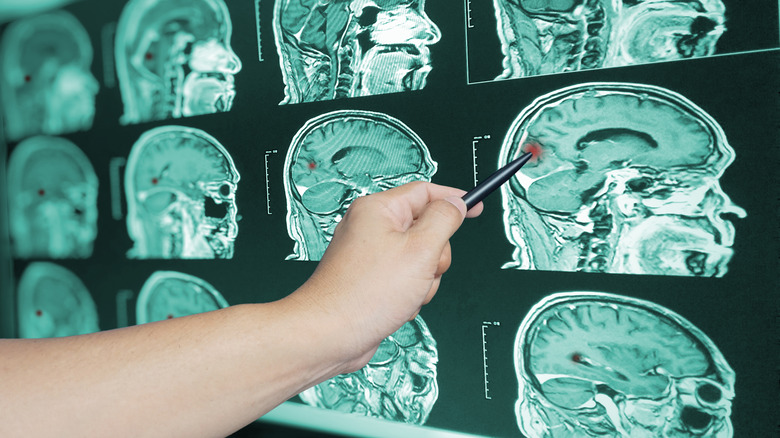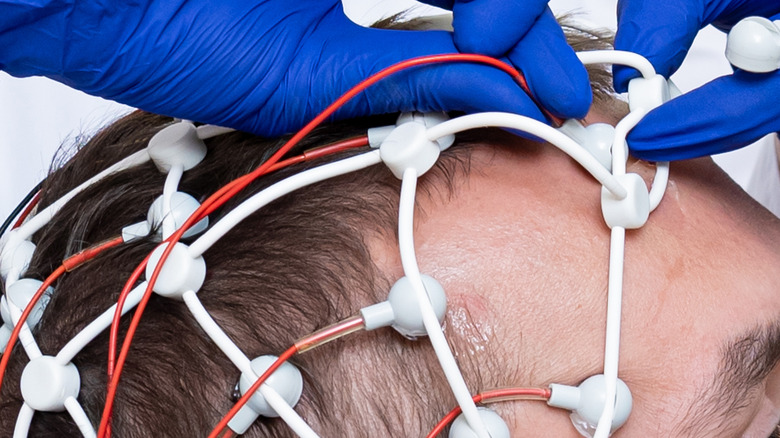Science Gave Us A Glimpse Into How Much Our Life Really Does Flash Before Our Eyes During Death
Remember what it felt like to watch that ball you just sent soaring into the outfield go right over the rival players' heads and clear the fence line at the edge of the perimeter? You rounded the bases to the sound of roaring applause and crossed over home plate knowing full well that you'd just won your team the game. What about prom a few days later? Do you remember that? Or the birth of your first child a few years after that? For every year that's come and gone throughout your life, you've been left with a handful of memories to mark its passing — some good, some bad. Wouldn't it be nice to relive some of the best ones you have? Well, as it turns out, you might get the chance to one day.
However, there's a catch. The day you get to vividly recall the best moments of your life will probably be your last day on earth. We've all heard various accounts of people who have flatlined for a short period of time before pulling back from the gates of death and declaring that they "watched their entire life" flash before their eyes. According to All That's Interesting, there's a good chance that that's exactly what happens when you die. Whereas researchers have only been provided with limited materials to test this theory in the past, they were recently presented with an opportunity that brought the matter to new horizons.
A dying brain is a nostalgic one
Frontiers reports that a group of scientist recently got the chance to tactfully observe a dying human brain in a way that's never been done before. After an 87-year-old man was turned over to the care of doctors following a traumatic brain injury, experts were able to track the neurological variations that took place as he quietly crossed over the threshold between life and death. According to All That's Interesting, the patient had fallen down a flight of steps and severely injured his head in the process. He reportedly experienced a heart attack after the fact and started having subsequent seizures as a result of cardiac arrest coupled with brain trauma, and the experiment that hospital scientist were able to perform revealed some pretty remarkable things regarding death.
"Through generating oscillations involved in memory retrieval, the brain may be playing a last recall of important life events just before we die, similar to the ones reported in near-death experiences," Dr. Ajmal Zemmar shared, following his team's discovery. Basically, the dying brain exhibits certain behaviors that elicit distinct memory recollection during life, oftentimes the same kind we display during dreams or when we find ourselves in a state of deep recollection (via All That's Interesting).
How does the dying brain recall memories?
The prime focus of the study were the patient's gamma oscillations. According to the National Library of Medicine, gamma oscillations are "rhythmic fluctuations in local field potentials (LFPs) that span a broad range of frequencies." In laymen's terms, they're basically electrical brain waves that are active during different states of consciousness. As his brain died, the 87-year-old subject started to exhibit notable variations in his gamma and alpha waves, which generally indicates an uptick in memory recollection and flashbacks. What that really suggests is that the dying brain does in fact delve back into its arsenal of memories as it gradually relinquishes activity altogether. Ergo, your life — or at least a good bulk of it — very well might flash before your eyes as you die (per All That's Interesting).
"Given that cross-coupling between alpha and gamma activity is involved in cognitive processes and memory recall in healthy subjects, it is intriguing to speculate that such activity could support a last 'recall of life' that may take place in the near death state," researchers shared following the man's death. While this experiment has been performed on lab rats in the past, this is the first time that scientists have been able to meticulously apply it to a human brain as it gradually approaches death, as All That's Interesting reports. These findings might contradict the widely-entertained notion that dying is in fact a relatively smooth and peaceful process.
Other factors at play during the study
Of course, all variables need to be considered during an elaborate study that aims to determine tangible and reliable facts. Scientists assigned to the case were fully aware that the patient had experienced severe head trauma and was having subsequent seizures, followed by a heart attack. They therefore had to consider the possibility that damage to the brain and body as a whole could have confounded an otherwise organic and untarnished analysis of his brain dying under less detrimental circumstances. All the same, they're fairly certain that their findings reflect what actually happens to the brain when it dies, regardless of the context (per All That's Interesting).
"Something we may learn from this research is: although our loved ones have their eyes closed and are ready to leave us to rest, their brains may be replaying some of the nicest moments they experienced in their lives," researchers shared. According to All That's Interesting, the patient's family members were the ones who allowed scientists to carry out the experiment and release the data they produced to the public. The study and its findings are posted at Frontiers.



